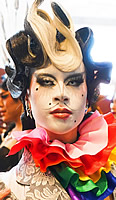
of Service to Asia's
Gay & Lesbian Community!
| Covid Recovery Discount: to help build your business back up, we are offering a 50% or higher discount off 12 months on any of our promotions ! |
|
| |||||||||||||||||||||||||||||||||||||||
| AIDS/HIV News Archive: JAPAN
HIV Vaccine Tested for Japanese Patients 1/04/04 -- Daily Yomiuri Clinical trials of an HIV vaccine developed exclusively for Japanese patients have begun at the Research Hospital of Tokyo University's Institute of Medical Sciences, the hospital announced Saturday. The vaccine is designed to target a large number of Japanese with genetically similar immune cells and could lighten the financial and physical burdens of HIV patients who take drugs to stave off progression to AIDS, said hospital officials. Director Aikichi Iwamoto and colleagues mixed healthy immune cells taken from HIV patients with HIV viral segments taken from the same patients. After letting immune cells learn the attributes of the virus they were to target, they were then injected back into the bodies of the patients. The doctors then mapped out methods to encourage the immune cells to attack HIV. For two years, doctors will observe whether the vaccine can keep HIV levels low enough to prevent progression to AIDS, said the officials.
Japan Only Now Confronting Rising HIV Rate 17/03/03 -- San Francisco Chronicle At a popular Tokyo restaurant, a dozen young sex workers are engrossed in a heated debated over ways to avoid AIDS and other STDs and still keep their jobs should a client insist on not using a condom. The women are attending a monthly meeting led by former prostitutes and health activists working for the nongovernmental organization Sex Work and Sexual Health (SWASH). UNAIDS reports that just 12,000 adults out of 127 million Japanese have HIV. But during 2002, Japan recorded unprecedented new infection rates with 301 new cases of AIDS and 595 HIV cases. Health experts say this number could increase to 50,000 by 2010 because of a booming sex trade (estimated at $13 billion annually), declining condom use, lack of an effective government awareness program, increased sexual activity among young people and the low status of women in Japanese society. According to Masako Kihara, an AIDS expert and adviser to the health ministry, more than 60 percent of the newly infected are in their teens or 20s. Numerous surveys demonstrate that most men and women in their 20s do not use condoms. Kihara points to a lack of AIDS education for young people, whose ignorance about the subject she describes as "frightening." AIDS education in primary and middle school, which began just last year, focuses on eliminating HIV discrimination rather than teaching safe sex, AIDS activists complain. Activists and some academics also highlight a culture that discourages female assertiveness. "A woman initiating the issue of HIV with their partners and asking them to use condoms would appear rude and challenging, an image she would want to avoid," said Yasuko Muramatsu, professor of women's studies at Gakugei University in Tokyo. Meanwhile, Kihara says that without an effective government program, "all signs in Japan point to higher HIV rates in the future."
Japan's HIV Cases Rose in Last 3 Months of 2002 31/01/03 -- Associated Press Japan's health authorities announced Friday an increase in the number of people testing positive for HIV through December over the previous three months. Of the 139 new cases, 77 were transmitted via homosexual contact, said Makoto Iwakura, a spokesperson for the Ministry of Health, Labor and Welfare. Forty-five of the new cases were transmitted through heterosexual contact with no reported transmissions through infected needles. During the same October-December period, Japan's total number of AIDS patients increased to 2,549 with 61 HIV-positive people developing AIDS and four AIDS patients dying. The ministry's committee on AIDS surveillance began compiling statistics over three-month periods in 1984 after the first AIDS patient in Japan was diagnosed.
Japan Needs Refresher in AIDS Awareness 07/10/02 -- Nikkei Weekly According to the Japanese Ministry of Health, Labor and Welfare, there were 621 new HIV cases reported and 332 cases of AIDS in 2001, both record highs. Excluding those infected through blood coagulants, the number of new HIV cases surged by 159, or 34 percent, from the previous year, to a cumulative of 4,526 cases. There are an estimated 950,000 HIV-infected people in North America and 550,000 in Western Europe. However, public health experts argue that the situation in Japan is deteriorating faster than anyone anticipated, and they predict there will be 16,000 HIV cases in Japan by 2003 and up to 50,000 cases by 2010. Since 1992, Tokyo Gas Co. has been holding company-wide sessions where an advisor specializing in AIDS education delivers lectures to rank-and-file employees and mid-level managers. The lectures vary from basic knowledge of the disease to human rights in the workplace. "When conveying a message to the new graduates in particular, we emphasize that the number of young sufferers is rising rapidly," said Kazuko Matsuzaki, director of TG's health promotion center. The number of new male HIV cases reached 475 in 2001, up from 108 nearly a decade ago. Males under age 29 accounted for over 38 percent of the total, up from 31 percent on average from 1985 to 2000. "I can say that Japan is now facing a second wave of AIDS, with a lot of people quite unaware that they can be exposed to the disease through sexual intercourse," said Seiichi Ichikawa, professor of public health at Kanagawa Prefectural College of Nursing and Medical Technology. Matsushita Electric Industrial Co. offers a free checkup at its health care centers in Osaka and Tokyo not only to its 50,000 employees but also to their families. They can remain anonymous so that there will be no report sent to their superiors at work, and the centers even offer phone and face-to-face counseling services. Hiroshi Hasegawa, representative of Japanese Network of People Living with HIV/AIDS, admits some leading companies are becoming good at maintaining HIV patients' privacy, but he fears many companies still make a grudging response to circumstances, thinking they dare not look into such controversial issues.
6 Died of AIDS in Japan So Far This Year 12/05/00 -- Kyodo News Service Japanese health officials reported Tuesday that 36 people died from AIDS in the first 10 months of 2000. In September and October alone, there were four AIDS deaths, 62 new cases of AIDS diagnosed, and 88 new HIV infections. The Health and Welfare Ministry said that there are now more than 7,000 people with HIV or AIDS in Japan.
Japan HIV, AIDS Cases Jump in First Half of 1999 12/01/99 -- Reuters In Japan, 145 new AIDS patients were reported in the first half of 1999, the nation's highest ever increase during a six-month period. The numbers reflect a sharp increase among high school and university students, a health ministry official noted. Between January and June, a total of 230 new cases of HIV were recorded in Japan, including two people who contracted the disease after receiving tainted donated blood.
HIV Infection Rates in Japan Projected to Increase 28/8/99 -- Lancet Officials from Japan's Health and Welfare Ministry predict that the number of Japanese infected with HIV will more than double by 2003. According to a new report, there will be an estimated 15,400 Japanese with HIV by 2003, compared to 7,320 at the end of 1998. The researchers say that most of the HIV cases would be in and around Tokyo.
Japan: Still Complacent About HIV/AIDS 6/1/99 -- IPS Wire Japan has the lowest public awareness of HIV/AIDS among industrialized nations, despite a steadily rising number of HIV/AIDS cases in the country. Over 550 new HIV cases were reported in the first 10 months of 1998, with 38 percent of the overall number HIV infections and full-blown AIDS cases occurring among people in their twenties. Analysts note that attitudes and taboos concerning the open discussion of sex need to change before AIDS education comes to the fore.
Popular Drama Prompts Interest in HIV 5/12/98 -- Lancet The number of HIV-1 tests performed at public health centers in Japan more than doubled between July and September of this year, because of the popularity of a television show featuring a high-school girl infected with HIV through prostitution. HIV awareness in Japan ranks among the lowest of any developed nations; Kazuko Ishida of the Health and Welfare Ministry's AIDS surveillance department notes that "until [the miniseries] aired, public awareness about the disease had declined for five straight years because the media hadn't touched the subject." Health centers conducted 18,561 HIV-1 tests from July to September, compared to 9,444 tests during the previous three months.
Japan's Health Ministry Announces AIDS Campaign 29/9/98 -- Kyodo News Service Japan's Health Ministry will launch in October a six-month AIDS education campaign aimed at the nation's youths. The effort will feature presentations and educational materials that will be distributed at high schools and universities throughout Japan. AIDS education kits will also be available to help teach younger students about the disease. Ministry officials hope the effort will make people review their own behavior, as well as participate in the campaign's activities. Statistics show that 268 Japanese contracted HIV last year, one-third of whom were in their 20s.
Japan Had Record 250 New AIDS Patients in '97 27/1/98 -- Kyodo News Service Japan's Health and Welfare Ministry's AIDS Surveillance Committee announced Tuesday that a record 250 new AIDS cases were recorded in 1997. The agency also reported 397 new HIV infections, 162 of which were related to sexual contact. By year-end 1997, Japan had recorded a total of 1,684 AIDS cases and 3,357 HIV-positive individuals. One of the committee members stressed the need "to promote preventive education that focuses on the sexual behavior of men."
CHAIRMAN OF GOV'T PANEL FIRED OVER HIV REMARKS 17/7/97 -- Mainichi Daily News The head of a government panel was fired Wednesday over comments he made about health benefits for people infected with the HIV virus. "Taxpayers tend to see (free medical benefits for HIV sufferers) as a waste of money," said Akira Nakajima, head of the Health and Welfare Ministry advisory panel on whether HIV sufferers should get official recognition as being disabled. "In Thailand, they pour their resources into prevention, and let those who are already infected die," he said. Nakajima, a professor emeritus at Juntendo University, cited public coldness toward HIV carriers as a factor behind his comments at a meeting Tuesday. Ministry officials who attended the meeting acknowledged the comments were prejudiced. Nonetheless, Nakajima's comments aroused distrust in the government among HIV sufferers. |

|
Phnom Pehn's gay men-only boutique hotel, spa, pool and restaurant... |

|
QUNCI VILLAS, a gay-friendly, gay-managed tropical resort on the heavenly island of Lombak, just next to Bali... |

|
At Bangkok Pride (photo: Amp Puttipong) |

|
At Bangkok Pride (photo: Siam Pride) |

|
At Bangkok Pride (photo: Siam Pride) |

|
At Bangkok Pride (photo: Siam Pride) |

|
At Tokyo Rainbow Pride |

|
Dynamic duo at Cambodia Pride |

|
Special photo exhibition by Mark Leighton! |
HOTELS IN ASIA + UTOPIA MEMBER DISCOUNTS + GALLERY AIDS/HIV INFO + ASIAN NEWS ARCHIVE + SAFER SEX + TRAVEL TIPS ADVERTISE + ABOUT UTOPIA + EMAIL US
Australia
+ Bhutan
+ Cambodia
+ China (including Hong Kong, Macau, Tibet)
+ East Timor
+ India
+ Indonesia
+ Japan + Korea
+ Laos All original text, images and content (c) 1994-2026. Utopia is a Registered Trademark. 乌同邦 |

![[HOME PAGE]](homopage.gif)